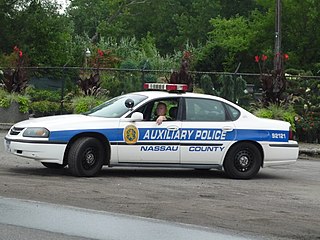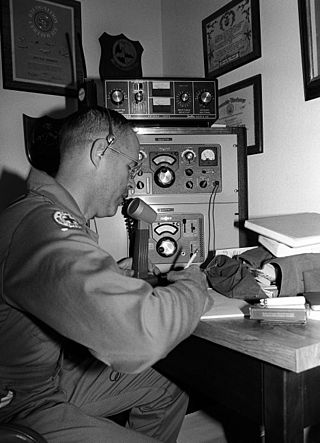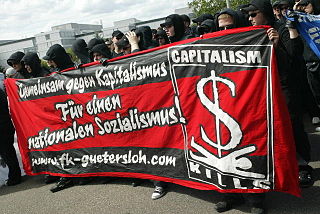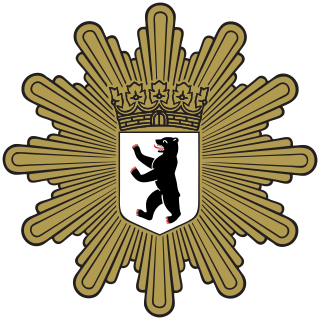
The Geheime Staatspolizei, abbreviated Gestapo, was the official secret police of Nazi Germany and in German-occupied Europe.
Neo-Nazism comprises the post–World War II militant, social, and political movements that seek to revive and reinstate Nazi ideology. Neo-Nazis employ their ideology to promote hatred and racial supremacy, to attack racial and ethnic minorities, and in some cases to create a fascist state.

A paramilitary is a military that is not part of a country's official or legitimate armed forces. The Oxford English Dictionary traces the use of the term "paramilitary" as far back as 1934.

The Ordnungspolizei, abbreviated Orpo, meaning "Order Police", were the uniformed police force in Nazi Germany from 1936 to 1945. The Orpo organisation was absorbed into the Nazi monopoly on power after regional police jurisdiction was removed in favour of the central Nazi government. The Orpo was controlled nominally by the Interior Ministry, but its executive functions rested with the leadership of the SS until the end of World War II. Owing to their green uniforms, Orpo were also referred to as Grüne Polizei. The force was first established as a centralised organisation uniting the municipal, city, and rural uniformed police that had been organised on a state-by-state basis.

Auxiliary police, also called volunteer police, reserve police, assistant police, civil guards, or special police, are usually the part-time reserves of a regular police force. They may be unpaid volunteers or paid members of the police service with which they are affiliated.

Auxiliaries are support personnel that assist the military or police but are organised differently from regular forces. Auxiliary may be military volunteers undertaking support functions or performing certain duties such as garrison troops, usually on a part-time basis. Unlike a military reserve force, an auxiliary force does not necessarily have the same degree of training or ranking structure as regular soldiers, and it may or may not be integrated into a fighting force. Some auxiliaries, however, are militias composed of former active duty military personnel and actually have better training and combat experience than their regular counterparts.

The Sudetendeutsches Freikorps (SFK) was a paramilitary organization founded on 17 September 1938 in Germany on direct order of Adolf Hitler. The organization was composed mainly of ethnic German citizens of Czechoslovakia with pro-Nazi sympathies who were sheltered, trained and equipped by the German army and who conducted cross-border terrorist operations into Czechoslovak territory from 1938 to 1939. They played an important role in Hitler's successful effort to occupy Czechoslovakia and annex the region known as Sudetenland into the Third Reich under Nazi Germany.

Law enforcement in Germany is constitutionally vested solely with the states, which is one of the main features of the German political system.

Human rights in Austria are generally respected by the government; however, there were problems in some areas. There were some reports of police abuse and use of unjustified force against prisoners. Antisemitic incidents, including physical attacks, name-calling, property damage, and threatening letters, telephone calls, and Internet postings occurred during the year. There was some governmental and societal discrimination against fathers, Muslims and members of unrecognized religious groups, particularly those considered "sects". There were incidents of neo-Nazi activity, rightwing extremism, and xenophobia. Trafficking in women and children for prostitution and labor also remained a problem.

The far-right in Germany slowly reorganised itself after the fall of Nazi Germany and the dissolution of the Nazi Party in 1945. Denazification was carried out in Germany from 1945 to 1949 by the Allied forces of World War II, with an attempt of eliminating Nazism from the country. However, various far-right parties emerged in the post-war period, with varying success. Most parties only lasted a few years before either dissolving or being banned, and explicitly far-right parties have never gained seats in the Bundestag post-WWII.

Autonome Nationalisten are German, British, Dutch, and to a lesser degree Flemish, nationalists, who have adopted some of the far-left and antifa's organizational concepts, demonstration tactics, symbolism, and elements of clothing, including Che Guevara T-shirts and keffiyehs. Similar groups have also appeared in some central and eastern European countries, beginning with Poland, the Czech Republic, Ukraine, Romania and Greece and others.

The National Socialist Underground, or NSU, was a German neo-Nazi militant organization active between 2001 and 2010, and uncovered in November 2011. Regarded as a terror cell, the NSU is mostly associated with Uwe Mundlos, Uwe Böhnhardt and Beate Zschäpe, who lived together under false identities. Between 100 and 150 further associates were identified who supported the core trio in their decade-long underground life and provided them with money, false identities and weapons. Unlike other terror groups, the NSU had not claimed responsibility for their actions. The group's existence was discovered only after the deaths of Böhnhardt and Mundlos, and the subsequent arrest of Zschäpe.

The Berlin Police is the Landespolizei force for the city-state of Berlin, Germany. Law enforcement in Germany is divided between federal and state (Land) agencies.

Combat 18 is a neo-Nazi terrorist organisation that was founded in 1992. It originated in the United Kingdom with ties to movements in Canada and the United States. Since then, it has spread to other countries, including Germany. Combat 18 members have been suspected of being involved and directly responsible in the deaths of numerous immigrants, non-whites, dissidents, and the German politician Walter Lübcke as well as internecine killings of Combat 18 members.
The Freiwilliger Helfer der Volkspolizei was an auxiliary police service in East Germany from 1952 to 1990.
The Freiwilliger Polizeidienst are voluntary police services in Germany under different denominations, operated by non-professional forces. In most states, the forces are composed of trained volunteers, acting as an assisting and reserve force to the regular police force. Due to the fact, that the voluntary police services are state-run institutions, the equipment, training and tasks differ. Through patrols, it is supposed to ensure public order and safety.

The Atomwaffen Division, also known as the National Socialist Resistance Front, is an international far-right extremist and neo-Nazi terrorist network. Formed in 2013 and based in the Southern United States, it has since expanded across the United States and it has also expanded into the United Kingdom, Argentina, Canada, Germany, the Baltic states, and other European countries. The group is described as a part of the alt-right by some journalists, but it rejects the label and it is considered extreme even within that movement. It is listed as a hate group by the Southern Poverty Law Center (SPLC), and it is also designated as a terrorist group by multiple governments, including the United Kingdom and Canada.
The New Order (NO) is a German neo-Nazi group recruited from both the Reichbürger movement and armed neo-Nazism. The founder and head of the group is neo-Nazi Meinolf Schönborn. In 2013, the federal prosecutor's office in Karlsruhe investigated members of the NO for founding a terrorist organization.














